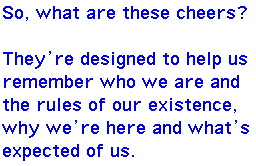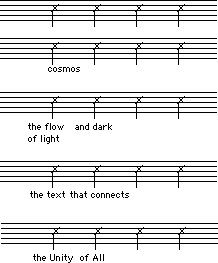 Did you know that we Jews invented the sports bar? You're sitting in one.
Did you know that we Jews invented the sports bar? You're sitting in one.Learning the Cheers
When was the last time you attended a concert? When was the last time you went to a sports event? When was the last time you played a musical instrument with a group of people? When was the last time you played a group sport? When was the last time you participated in a barn raising? When did you last help build a house with Habitat For Humanity? When was the last time you participated in any collective endeavor? Same with me.
But that's our task tonight and tomorrow.
We're not used to doing this. Putting out effort for something we have to share in common is very unusual for us.
Those of you who were with us on the morning of Rosh haShannah may recall that I led us through what we call the P'sukei d'Zimra. I even got us all singing "Hallelujah!" I think we who were here together even enjoyed it. We felt good about raising our voices in song.
When we ended those verses of song I mentioned that we had done our warm-up exercises and we were, I hoped, ready to get up for the serious effort ahead. I had hoped that we could maintain the participation level. However, for some unclear reason, that did not happen. I know, it doesn't have to be that way. But so many of us are "out of practice". How did we get that way, and how can we change it?
How many of you went to the SuperBowl game last year? How many of you got tickets to the World Series? Those of you who didn't... have you even gone to sports bar to watch an important game?
 Did you know that we Jews invented the sports bar? You're sitting in one.
Did you know that we Jews invented the sports bar? You're sitting in one.
Huh?
Over two thousand years ago, the Jews living all around the land of Israel lived a busy life. The main event happened in Jerusalem up in the mountains. The roads were less than two lane and most people usually had responsibilities at home so they did not go up to the Temple in Jerusalem as often as they might. In fact, they divided up the activities in the temple so that different communities would have a reserved place (on the 50 yard line so to speak) at designated times of the year. Even then not everyone in town was able to go. When it was their turn, the town's rep would go up to Jerusalem to the Temple and the locals would gather at the clubhouse. In fact they called it a meeting house "Beit Knesset". There, in the town clubhouse the locals would wear the appropriate clothes, drink the appropriate drinks, eat the appropriate foods, and call out the appropriate cheers... as though they were there in Jerusalem with their buddies, the representative.
After a while a local Howard Cosell would develop. He'd offer a commentary on what everything was all about. We call this in Hebrew a "drash" and so, the clubhouse also came to be known as the "Beit haMidrash".
So, here we are, two thousand years later. We sit here in our clubhouse. However, many of us haven't been practicing, or we haven't used our season tickets. We don't know how to recognize what a "first down" is and don't understand what "offsides" means and so when the cantor and I lead the cheer: "Push 'em back, push 'em back, way back!", we're not all able to participate with the right kind of intensity.
So, what are these cheers?
They're designed to help us remember who we are and the rules of our existence, why we're here and what's expected of us.
You know that after the warm-up exercises the cantor here calls us all together to praise the Source of the cosmos. As soon as we've done that we focus on the cosmos itself, the flow of light and darkness. We then look inward a bit and call out the cheer that speaks of the connection between the cosmos, its creator and human beings. And all of this leads us to a renewed awareness of the unity of all creation so we say the Shema.
Maybe the logos on the pennants are a bit outdated. Maybe the rhythms of the cheers need a renewed beat. But hey, think if it:
Cosmos
The flow of light and dark
The text that connects
The unity of all
Can you imagine cheers more awesome? It feels good, reassuring, even, to repeat them:
Cosmos
The flow of light and dark
The text that connects
The unity of all

Cosmos
The flow of light and dark
The text that connects
The unity of all
Cosmos
The flow of light and dark
The text that connects
The unity of all
But it doesn't stop there. We Jews believe that the Source of the cosmos plays a role in human history. You've heard me refer to this before. We celebrate this in our holidays (not Rosh haShannah and Yom Kippur, but) Pesach especially. And so we have special songs we sing that cheer about how this Source of the cosmos interrupted the cycle of events and set a trajectory into history by enabling a group of slaves to go free. That's what we're doing when we sing:
Who is like you among all the team managers who people cheer for?
You enable redemption
Now this is getting personal. Not only do we cheer that redemption happens, but that was our redemption! The tension and excitement builds:
Cosmos
The flow of light and dark
The text that connects
The unity of all
You enable redemption
It's at this point that our cheers get up close and personal. But, you get the point.
Join us at the clubhouse. Together we can create a symphony that will raise the roof.
©Mark Hurvitz
1999